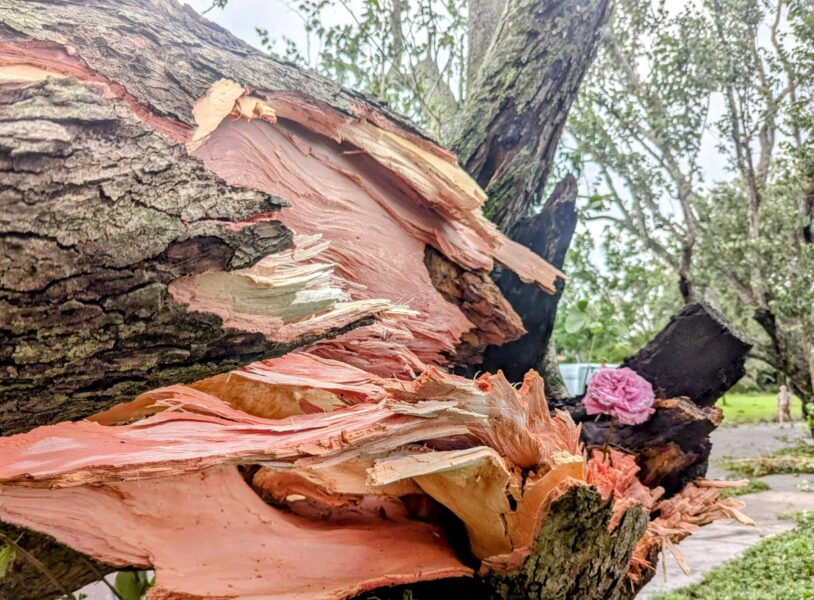St. Petersburg residents, small business owners and city employees still reeling from Hurricanes Helene and Milton will soon receive additional support from their neighbors.
Officials will begin disbursing over $800,000 donated to the We Are St. Pete Fund in March. City council members unanimously approved multiple program parameters Thursday.
The fund will provide $400,000 in disaster assistance grants for residents, $200,000 for small businesses and $200,000 for non-resident city employees. Administrators used $100,000 from their $200,000 seed donation to provide immediate, direct relief for storm victims.
The program evolved through two committee meetings. Council Chair Copley Gerdes thanked the administration for incorporating their feedback.
“I know we went through a couple of iterations,” Gerdes said. “But this came out awesome.”
Mayor Ken Welch established the We Are St. Pete Fund in Helene’s immediate aftermath. Milton arrived days later, which exacerbated the need for assistance.
The back-to-back hurricanes damaged nearly 16,000 homes in St. Petersburg. Officials designed the fund to fill financial gaps left by federal and state initiatives.
The grants, administered through the Pinellas Community Foundation, will provide homeowners flexibility to address rebuilding or storm-hardening costs. In previous discussions, city council members stressed the importance of also supporting renters, small businesses and non-resident employees.
Avery Slyker, housing and community development director, announced Thursday that St. Petersburg received an additional $65,000 through the State Housing Initiatives Partnership Program (SHIP). That brings the city’s housing disaster assistance funding to $1.8 million.
Homeowners can receive up to $30,000 for tree removal and structural repairs. The city will also provide up to $5,000 for insurance deductibles.
Tenants can receive $10,000 for up to three months of rent payments. The program is retroactive to Sept. 26, 2024.
Slyker said homeowners can use their previously established contractor or a municipal partner. However, officials will ensure all companies have appropriate licenses, insurance and city vendor registration. “Without registering, they cannot receive pay,” she added.

St. Petersburg’s $1.4 million in state and federal disaster housing assistance has an 80% area median income (AMI) cap. City officials will dedicate $400,000 through the We Are St. Pete Fund to residents earning up to 140% of the AMI – $93,660 for one person.
Applicants must submit award or denial letters from the Federal Emergency Management Agency and insurers. The city will rely on self-attestation for individuals with assets under $50,000. Companies, utility providers and landlords, rather than residents, will receive payments.
“There is going to be one application,” Slyker said. “And we have made the application as simple as possible with self-attestation.”
She said non-resident employees would apply under the same guidelines. However, city staff will determine their eligibility.
Slyker noted that over 150 employees await assistance. She said that number “has risen.”
The city’s housing assistance program will open March 11. Small business owners can begin applying for $200,000 in We Are St. Pete Fund grants during the final week in March.
Brian Caper, economic and workforce development director, thanked the council for including home-based businesses in the program. Those operating from shared commercial space are also eligible.
Caper said businesses must be independently owned and operated within city limits, have less than 50 employees and show proof of eligible losses to receive grants. Applicants must also expect to reopen or fully resume operations.
Home and shared commercial space-based businesses can receive $2,500 for equipment and inventory damage. The number increases to $5,000 for brick-and-mortar storefronts.
“During Covid, we learned a lesson that when we do all of this economic development – specifically, toward our small business community – these home-based businesses get left out,” said Councilmember Brandi Gabbard. “So, I’m really glad to see they’re included.”
Business owners can receive $10,000 for storm-induced structural repairs or relocation costs within the city. The program will award $15,000 to those with equipment, inventory and building damage.
Jess Riedel, senior operations analyst, said the available funding would likely increase. Officials dedicated $100,000 in seed money to administrative costs, which she called “very minimal” due to program efficiencies.
Riedel said administrators would redirect the unspent allocation to storm victims. “And there are still donations actively being received by the fund.”
To contribute, visit the website here.
